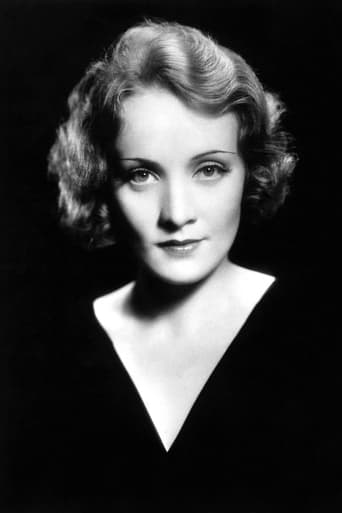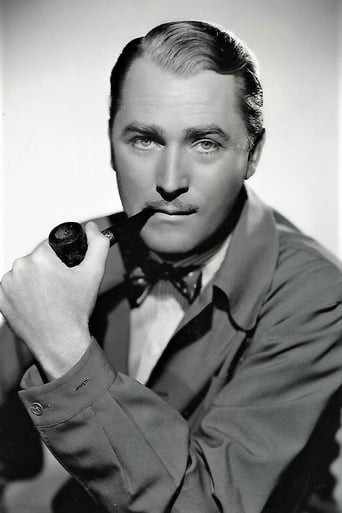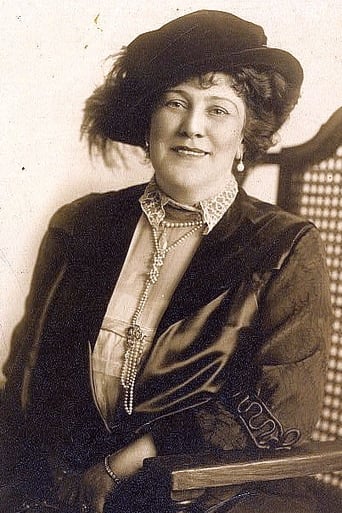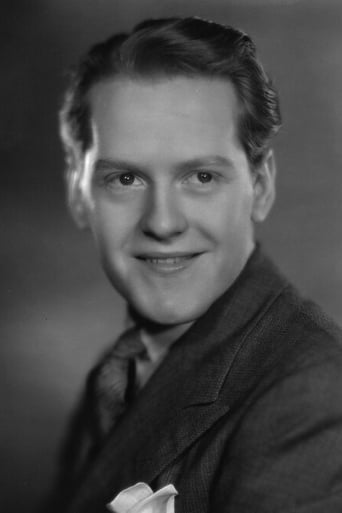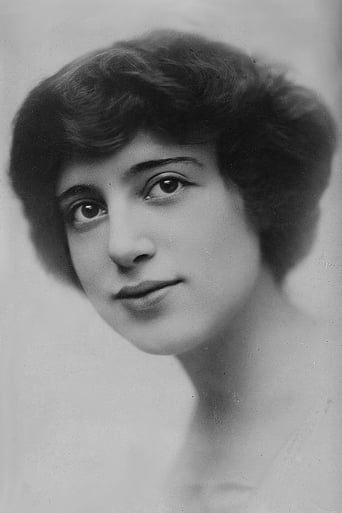Nonureva
Really Surprised!
Brendon Jones
It’s fine. It's literally the definition of a fine movie. You’ve seen it before, you know every beat and outcome before the characters even do. Only question is how much escapism you’re looking for.
Suman Roberson
It's a movie as timely as it is provocative and amazingly, for much of its running time, it is weirdly funny.
Aneesa Wardle
The story, direction, characters, and writing/dialogue is akin to taking a tranquilizer shot to the neck, but everything else was so well done.
Antonius Block
The plot to this film is pretty simple, but wow, Marlene Dietrich is fantastic in the leading role, and director Robert Mamoulian makes the most of his actors and the script in crafting a beautiful film. Dietrich skillfully handles her role which shifts from a naïve young country girl, to a model and lover of a sculptor, to the unhappy wife of an older man, and lastly to a cabaret girl. Her performance is especially impressive for the time, when over-acting and exaggerated facial gestures were common; Dietrich by contrast is polished and smooth, sexy in a sultry, understated way, and quite a singer on top of all that. Director Robert Mamoulian, who also directed the brilliant Dr. Jekyll and Mr. Hyde in 1931, pulls all the right strings here, and there are some beautiful shots, examples of which are shifting clouds in front of the moon and sunlight reflecting off the water as Dietrich is out riding. The movie is also elevated by quotes from the poetry of the Biblical book of the Song of Songs, and it's a nice mix of sophistication and pre-Code naughtiness. The scene when Dietrich disrobes for a nude modeling session, where Mamoulian cuts to sculptures to represent her body, brings a smile. The plot itself isn't going to blow you away, but Dietrich will. Very enjoyable.
bkoganbing
The Song Of Songs was Marlene Dietrich's first American film without her German Svengali, Josef Von Sternberg. Maybe the German Von Sternberg might have been able to do something more with German author Hermann Sudermann's melodramatic plot. Something was terribly missing in the translation.When we first meet Dietrich she's an innocent country lass just lost both her parents come to live with her big city aunt, Alison Skipworth. Skipworth hasn't any great maternal feelings for her niece, but she does give her room and board and her job assisting at Skipworth's bookstore requires no great strain. In fact Marlene is a bright young woman and takes to the job.She gets a different job soon enough when sculptor Brian Aherne hires her as a model for a nude statue. Some of the nude sketches and the statue itself would not have made it in the film two years later when The Code was in place. She gets silly romantic notions about Aherne, but the guy whose mojo she gets going is Baron Lionel Atwill who's willing to marry her and does on the rebound.Of course that doesn't work out, for crying out loud it's Lionel Atwill she's marrying and who catches her with riding instructor Hardie Albright during a fire when both flee the scene. After that she becomes the Marlene whom we met in Shanghai Express, Shanghai Lily. Curiously enough Dietrich's character is Lily Czepanek.The film is carried by Dietrich on the strength of her performance, she transforms herself into several different characters, the country innocent, the degraded baroness, to the jaded woman of the world. It took more than one man to turn her into German Lily.One thing I was very much looking forward to is hearing her sing Jonny after having Dietrich's recording of it on one of my record albums. The song is by Frederick Hollander who wrote Falling In Love Again for her. The record I have is in the original German, Dietrich sings it in English in the film. I'm hear to tell you that the German comes across far better than the English. That come hither voice loses a lot in translation.Rouben Mamoulian does his best with the film, but it's a let down after such work as Love Me Tonight. Anyway Dietrich was back with Von Sternberg after this film didn't light the world on fire.
netwallah
A romantic potboiler, in which a simple country girl, Lili (Marlene Dietrich) orphaned, goes to the city to stay with her aunt Rasmussen (Alison Skipworth), falls in love with Richard Waldow (Brian Aherne), a sculptor across the street. Her sense of what love could be is based on repeated readings of the Song of Songs, parts of which she recites ecstatically. But Lili marries Baron von Merzbach (Lionel Atwil) who has convinced Waldow he (the baron) can give Lili what he (the sculptor) can't—comfort, luxury, education, music, polish, status. She's steely and still, but a jealous housekeeper engineers a situation that will appear to disgrace her when Waldow is visiting, and Lili walks into the trap to hurt him. He finds her in some sort of a high-toned night spot, takes her back to the studio, she is bitter, insisting she is dead and crying out what right does that (pointing to the statue) have to live while I am dead? She seizes a sledge hammer and breaks the maquette and falls down on the floor among the shards. Waldow picks her up and recites a bit of the Song and she softens, and he says something about a future. Here we get all the Dietrich modes in one packet: the wide-eyed and innocent young girl with a fluting, sweet voice—the passionate woman discovering love—the frozen woman, who has made herself as cold as it is possible to be because nobody can hurt her that way---the cabaret cynic, wreathed in smoke, singing a slightly bawdy song with an arch, knowing look—the tear-filled eyes of the thawing woman surprised by hope. All clichés of the first order, but she does them well, and that's what they paid her to do. She only sings one song here, and it sounds very much like something leaning in the direction of Weill & Brecht, a sweet melody lurching into some jazzy discordant moments.
hildacrane
Interesting to see Dietrich, early in her Hollywood career, working with a director other than her Pygmalion, Josef von Sternberg. The latter director provided beautiful but often-static set-ups for framing her, while Mamoulian's musicality and fluid camera release her. (Think also of his direction of Garbo in "Queen Christina," and that film's famous scene in which she moves lovingly and rhythmically--it was timed to a metronome-- around the bedroom, watched by her lover. )I think this is one of Dietrich's best performances. She passes through many phases, from naive young girl to earthy woman. Her song "Johnny" is sublime--and moving, when she angrily tears into the second chorus after spotting in the audience the lover who had abandoned and disillusioned her.

